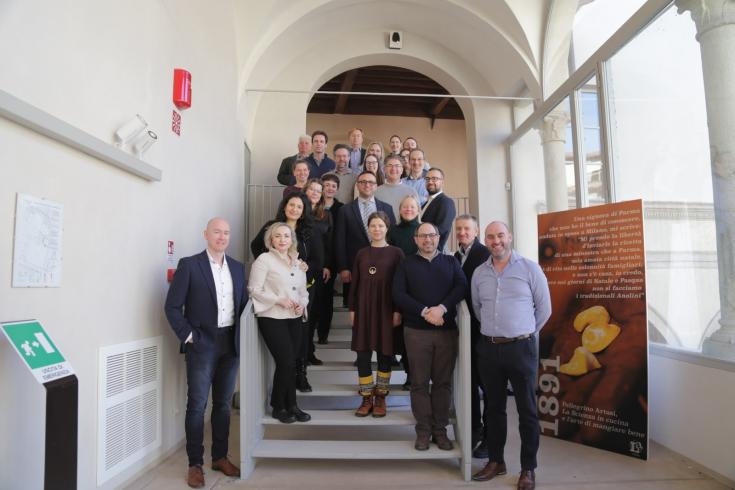MASTERCLASS 3: THE BUSINESS CASE IN SUSTAINABLE MOBILITY
WHEN: 30th and 31st January 2024
WHERE: Parma (Italy)
Third Masterclass focused on business in sustainable mobility. Lecturers from local authorities, public transport operators and leading private European companies, presented the challenges and opportunities for development and management of charging stations, electric vehicles, car sharing services, micromobility.
1. City of Parma presented their Sustainable Urban Mobility Plan and its goals for 2030:
- Provide charging point for every 1,000 inhabitants;
- 31,500 public rapid charging points by 2030;
2. Be Charge, a company controlled by Plenitude, is one of the key players on Italian market of EV charging infrastructure. The company has more than 20 000 installed charging points and 8 000 under construction. The charging network is available in more than 2.500 municipalities, reaching 100% of Italian regions. The company is actively developing its charging infrastructure across Europe and set a target to reach more than 30 000 station till 2030. The company starts the first of its kind in e- mobility, loyalty programme in Italy, Be Together.
3. INFOMOBILITY is joint-stock company 100% owned by the Municipality of Parma.
Shared mobility is constantly growing in Parma and Italy. 91% of shared vehicles in Italy are micromobility vehicles (scooters - bicycles - motorcycles). In 2023, out of 1400 total shared vehicles, 1200 were electric. Microbility is a very young industry in a period of big transformations. To be sustainable, based on the experience of Parma, the companies should aim at:
- Intermodal services - integration with urban mobility services is strategic;
- The service should be available not only in central area but also in the surrounding area;
- To make more efficient logistic costs (use of long-lasting battery);
- To give real benefits for end-users: Micromobility requires affordable prices to become a daily habit;
- To limit mess of vehicles: intermodal virtual stations in city center;
- To have vehicles built with anti-vandalism technologies.
4. TIER MOBILITY is among the largest operators in sharing micromobility globally, with over 250,000 vehicles actively operating in Europe and Middle East. The trends for development of micromobility show that:
- passenger miles will increase 3.5x by 2026;
- people want to substantially increase their use of green micromobility;
- cities are making concrete commitments to reduce carbon emissions, introducing plans to
reduce car usage, and investing more in micromobility infrastructure.
For the success of micromobility, it is important:
- integration with public transport and promotion of intermodality;
- supporting low coverage areas and low frequency time of the day;
- low city taxes;
- limitation of operators in a city.
5. ScaiMotor/Allways is a car sharing company operating in the city of Parma. Among the advantages of using its services are:
- access the areas of the Historic Center anywhere and at any time;
- park for free in the blue and white/blue lines;
- driving without paying any fixed costs.
Development goals:
- Fleet of electric vehicles with pick-up and drop-off in dedicated hubs;
- Extending the operational area;
- Integration of a totally electric car sharing service.
6. Arriva Group is amongst the leading operators of electric vehicles in Europe, operate 350 bike sharing bikes in Slovakia and Netherlands, operate waterbuses in Italy and Netherlands, mainly in joint venture with partners.
Company plans for the future include:
- Electrify 1st million km of regional transport within 3 years (CEF Funding, GBER changes);
- Electrify 100 % Urban transports by 2030;
- Establish a Megawatt charging capacity in City of Kranj in agreement with the national transmission operator – ELES;
- Combine¸ private and public charging in Koper Bus station to make more revenues and increase available charging infrastructure.
7. De Lijn is public transport company in Flanders, Belgium. The company has set a target to reach 100% emission- free public transport by 2035. The company is trying to provide a service at an exceptional level, incl. great comfort for passengers and enhanced safety.
After the Masterclass, participants visited the depot of Parma public transport company.
All participants agreed that zero carbon emission vehicles and charging infrastructure provide many opportunities and advantages for all stakeholders to develop new sustainable business models, support cities in their climate goals, and ease the passengers’ travel.
However there are still many challenges to overcome- high price of electric vehicles, not evenly developed charging infrastructure, differences in the regulatory framework across different cities and last but not least, the need to make the public transport more attractive, because the most ecological bus is the fully occupied bus.
